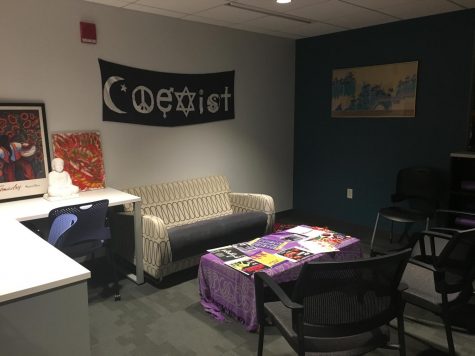Spiritual leaders and health professionals from Suffolk University discussed the role of the religious practices of yoga and mindfulness in secular education in the Sawyer building’s Stoll Room on Wednesday. Panelists included Professor of Psychology Dr. Susan Orsillo, Assistant Director of Wellness Education, Counseling, Health, and Wellness (CHW) Annie Crossman, Assistant Chaplain Sarah Fleming and Director of the Center for Community Engagement (CCE) Adam Westbrook.
They discussed the importance of authenticity in yoga and mindfulness practices and their place in education. The discussion also provided students with information about the various events offered at the Interfaith Center.
Panelists first spoke about mindfulness, explaining how it is the process of purposely bringing one’s awareness to experiences occurring in the present moment without judgment, which one can develop through the practice of meditation and other training.
“Our understanding [of mindful meditation] comes from the religious practice of Buddhism,” said The Rev Amy Fisher, the university’s chaplain.
“Mindfulness (from the Pali sati) cannot be separated from the Buddhist ethics and value systems that it emerged from. It is a practice geared toward collective awakening and must be seen in this context,” said Fleming.
They discussed the implementation of yoga and mindfulness in secular education and how it is often debated. Panelists agreed that these practices should not be required, and rather than having an “opt-out” practice, students should have the freedom to “opt in”. They believe that while students should have the opportunity to take yoga classes and participate in meditation sessions, they should not be forced to.
They further spoke on the complex line between meditation and religion, and where they overlap.
“We are trying to understand why secular education is trying to take something that is a religious practice, but not put it in the context,” said Fisher.
The Rev and other panelists spoke on how mindfulness and yoga have become “trending” practices in companies and in the media, and how they can lose their authenticity when separated from their historic and religious ties.
“In authentic Buddhist meditation, it is not really called mindfulness,” said Fisher, who works to retain the cultural and religious origins of the practices that the Interfaith Center offers. She also noted the difference between the Interfaith Center and CHW.
“[Annie Crossman] likes to practice their wellness in their office, but they’re never going to hold yoga classes in the wellness office because yoga is a religious practice based on Hinduism,” said Fisher. “We should give our students the benefit of authentic yoga practice [in the Interfaith Center].”
The panel was open for discussion between students. In the audience sat many students interested in pursuing professions in secular education and yoga and mindfulness and who were overall passionate about the subject.
“We were seeking to bring together students, faculty, and staff from psychology, religion, and Counseling, Health and Wellness in an effort to spark conversation on these topics,” said Fleming.

Interfaith Center in the Sawyer building at Suffolk University












